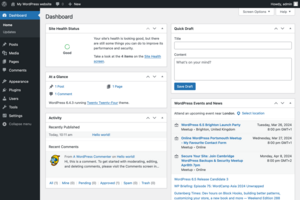
Back WordPress AF WordPress AN ووردبريس Arabic WordPress AZ WordPress BE WordPress BE-X-OLD WordPress Bulgarian वर्डप्रेस BH ওয়ার্ডপ্রেস Bengali/Bangla WordPress Catalan
 | |
 WordPress 6.4 Dashboard | |
| Original author(s) | |
|---|---|
| Developer(s) |
|
| Initial release | May 27, 2003[1] |
| Stable release | 6.7.1[2] |
| Repository | |
| Written in | PHP |
| Operating system | Unix-like, Windows, Linux |
| Size | 23.2 MB (compressed) |
| Type | Blog software, content management system, content management framework |
| License | GPLv2 or later[3] |
| Website | wordpress |
WordPress (WP, or WordPress.org) is a web content management system. It was originally created as a tool to publish blogs but has evolved to support publishing other web content, including more traditional websites, mailing lists, Internet forums, media galleries, membership sites, learning management systems, and online stores. Available as free and open-source software, WordPress is among the most popular content management systems – it was used by 43.1% of the top 10 million websites as of December 2023[update].[4][5]
WordPress is written in the PHP language[6] and paired with a MySQL or MariaDB database. Features include a plugin architecture and a template system, referred to within WordPress as "Themes".
To function, WordPress has to be installed on a web server, either as part of an Internet hosting service or on a computer running the WordPress software package.[7]
WordPress was released on May 27, 2003, by its founders, American developer Matt Mullenweg[1] and English developer Mike Little.[8][9] WordPress Foundation owns WordPress, WordPress projects, and other related trademarks.[10]
- ^ a b Mullenweg, Matt (May 27, 2003). "WordPress Now Available". wordpress.org. WordPress. Archived from the original on July 19, 2010. Retrieved July 22, 2010.
- ^ "WordPress 6.7.1 Maintenance Release". November 21, 2024. Retrieved November 21, 2024.
- ^ "WordPress: About: GPL". WordPress.org. Archived from the original on July 21, 2010. Retrieved June 15, 2010.
- ^ "Usage Statistics and Market Share of Content Management Systems for Websites". w3techs.com. W3Techs. December 24, 2023. Retrieved December 24, 2023.
- ^ "CMS Usage Statistics". builtwith.com. BuiltWith. Archived from the original on August 6, 2013. Retrieved August 1, 2013.
- ^ "Requirements". wordpress.org. WordPress. Archived from the original on January 20, 2020. Retrieved January 29, 2020.
- ^ "Support disaggregating WordPress.com and WordPress.org". wordpress.com. Archived from the original on December 30, 2015. Retrieved January 7, 2016.
- ^ mikelittle (April 21, 2003). "Commit number 8". Archived from the original on February 20, 2016. Retrieved February 3, 2016.
- ^ Patterson, Dan (February 6, 2017). "WordPress "quietly" powers 27% of the web". www.techrepublic.com. Archived from the original on February 5, 2018. Retrieved December 16, 2017.
- ^ "Trademark Policy". WordPress Foundation. September 9, 2010. Retrieved March 28, 2022.